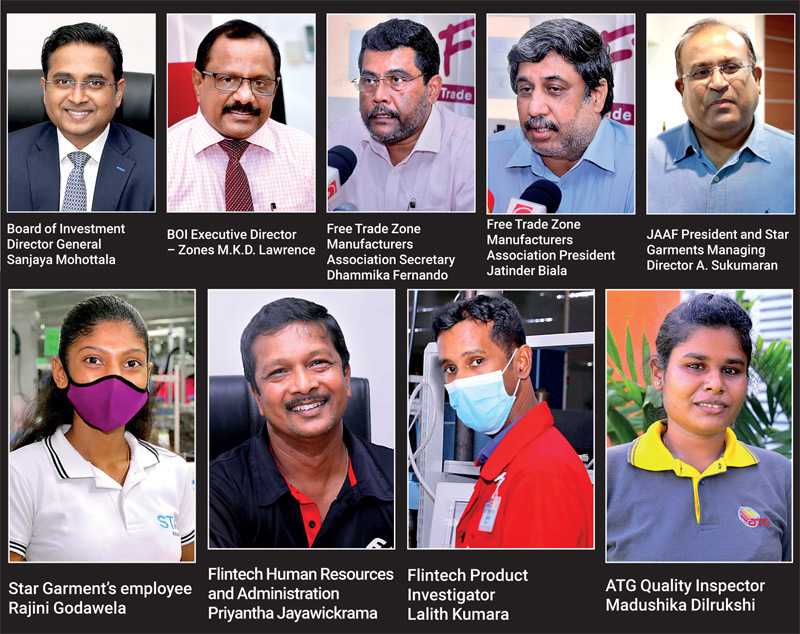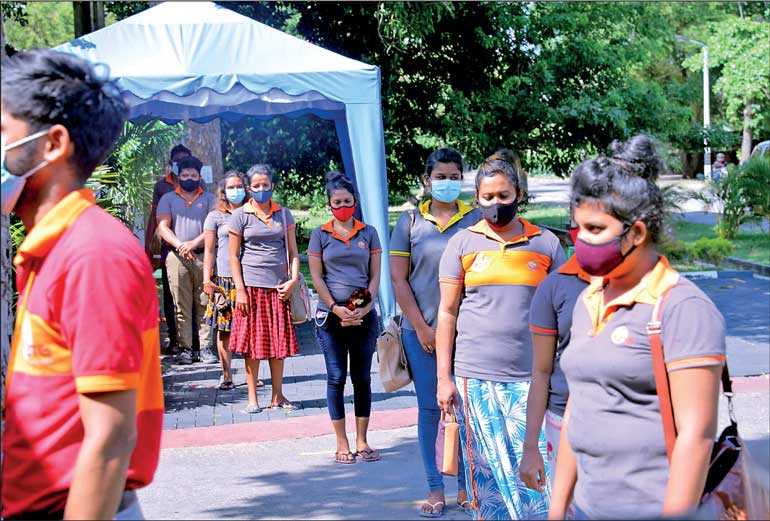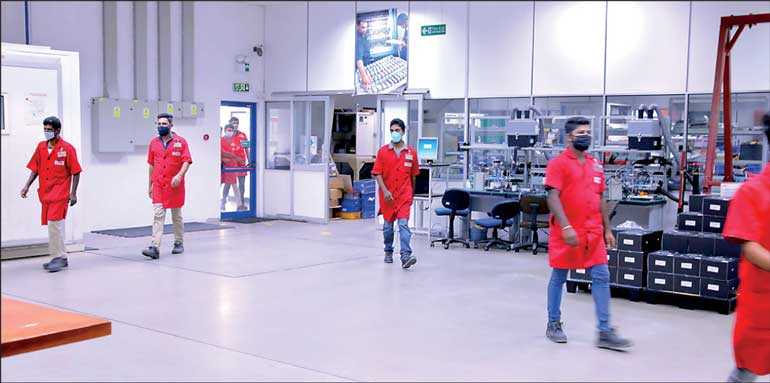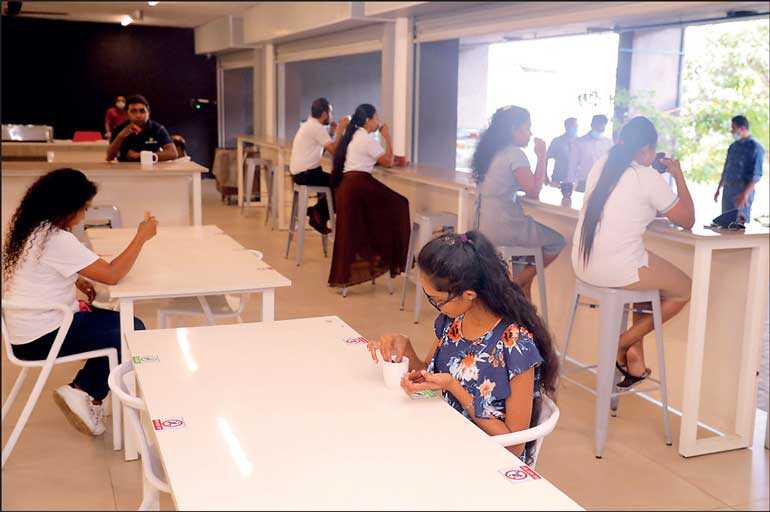Monday Feb 16, 2026
Monday Feb 16, 2026
Wednesday, 28 October 2020 00:30 - - {{hitsCtrl.values.hits}}

COVID-19 has once again arrived, hitting the country in a severe way after a short silent period. Though the cases are minimal comparing with the other South Asian countries, Sri Lanka has to strengthen her capacity to overcome future cluster eruptions.
The first wave of the COVID-19 battle was managed by Sri Lanka impressively with a low death rate and a very high recovery rate with the strong dedication of the military and the health professionals under the restrictive measures of the Government. It was forecast that developing nations would struggle under this global health crisis. Sri Lanka has so far managed the situation well, compared with the more advanced healthcare systems in the world.
This deadly menace is expected to last at least another year, even after the availability of a vaccine. Therefore, economic recovery could take a few years. Those assumptions have led the Government to enforce a lockdown by closing down the business and their employees out of livelihoods.
The World Bank has already predicted that nearly 150 million people globally will face extreme poverty under this situation. South Asia will lead the biggest share with 49 to 57 million of that. The Sri Lankan economy depends on the global economy for investment and for export earnings.
All countries that contribute the most to the global economy are extremely helpless in the face of COVID-19. Almost every state is facing a series of unforeseen crises, including economic collapse, social system problems and educational disruptions. At the same time, the global manufacturing and supply chain itself has become more critical than ever.
Economic stability is key
In the face of this challenge, the main achievement is the country’s economy while maintaining the health system. Economic stability will lead to safeguarding all other sectors. The country’s economy is largely supported by revenue from foreign workers, tourism, agricultural products including tea, and exports from factories under the Board of Investment of Sri Lanka.
At present the tourism industry is completely incapacitated. The only way to keep the existing risk economy afloat to some extent is to increase the country’s export earnings.
The products of factories under the Board of Investment of Sri Lanka contribute more than 70% of the total export earnings of the country. The worst COVID-19 affected country in the world, the USA, has a 45% share of the Sri Lanka’s apparel export market, followed by the UK 14%, Italy 8% and Germany 6%. These four countries hold a 73% share of the entire export market of the apparel sector, signalling an alarm of threatening demand for our dominant export earning sector.
BOI stance
Board of Investment Director General Sanjaya Mohottala said there are 12 Export Processing Zones and two Industrial Estates under the Board of Investment of Sri Lanka. In addition, many other factories are operating throughout the island. All this is about 1,800. These factories have over 500,000 direct employees. At the same time, a large number of indirect jobs such as food, lodging and logistics have been created in this connection.
The Board of Investment of Sri Lanka’s primary objective is to strengthen the Sri Lankan economy, while promoting Foreign Direct Investment into the country and increasing export earnings. It also works to improve economic and social wellbeing of the 500,000-strong workforce.
“In the face of this pandemic, we are providing the necessary facilities to the factories to continue their manufacturing process. Our aim is to maintain the production process well by following the health and safety procedures and guidelines. In the face of such a global epidemic, the Board of Investment of Sri Lanka sees the continuation of the manufacturing process for the benefit of the country as a national interest. All members of the Board of Investment of Sri Lanka are committed to this,” Mohottala added.
Second wave strategies
BOI Executive Director – Zones M.K.D. Lawrence said with the opening of factories after the first COVID-19 outbreak, they came up with strategies to face a second wave. Prior to the issuance of the ‘COVID-19 Safety Guidelines’ by the Ministry of Health, the Ministry of Health implemented a program to educate all factories in the area involving the medical officer of health, public health inspectors and the security forces.
Accordingly, spacing was increased between work desks, floor plans were changed within factories, and single use instead of shared surfaces were implemented. Also, under the guidance of the Board of Investment of Sri Lanka, a Health Safety Sub-Committee comprising the public health medical officer, public health inspectors and the security forces was set up to conduct regular inspections.
A few factories in the Katunayake EPZ had to be closed after the second COVID-19 wave. Most of the other companies are proceeding with their production work. At present about one-third of the total number of employees in Katunayake are employed. The Government has designated five high-risk areas that do not allow employees to report for duty. However, measures are being taken to provide dry rations and other necessities to the employees confined in these areas by the respected companies in order to safeguard their employees.
“It is erroneous that some employees are forced to work and there are no safety measures according to the COVID-19 guidelines within the zone. We as the Board of Investment of Sri Lanka strictly adhere to the COVID-19 -19 prevention guidelines provided by the Ministry of Health. At the same time, we make constant follow-ups with the factories for the employee’s monthly payments.”
Foreign orders a challenge
Free Trade Zone Manufacturers Association Secretary Dhammika Fernando said obtaining foreign orders had become a challenge in the face of the current global crisis. “However, the Government, BOI and the companies have acted with commitment and obtained foreign orders for factories in the country. We ensure that the safety and facilities of the workers in the factories are maintained at the highest level. And those are the conditions our international buyers expect.
“We have to bear a huge cost for the healthcare of our employees. As of 23 October we have carried out 14,263 PCR tests in the last two weeks. For that nearly Rs. 90 million has been spent. All the expenses are borne by the factory owners. We value our employee compliance requirements; therefore we don’t ill-treat our employees. At a time like this, all parties should unite as a country to get rid of this crisis collectively.”
Working together
Free Trade Zone Manufacturers Association President Jatinder Biala said his organisation was 40 years old and works as a bridge between the Government and the organisations.
“During this pandemic we worked closely with the BOI to take care of our investors and the employees and I’m pleased to say that our investors are taking a good care of our employees, irrespective of the places they stay in. One employee is equivalent to four people as family members depend on them. At the same time, we need to take care of our orders, so that they aren’t passed over to other countries.
“It’s very sad to see some individuals with vested interests spreading negative propaganda towards our investors, employees and the zone. There may be 100 positives and a very few shortcomings when we work in a situation like this. We assure that as the Manufacturers Association, we will look into those shortcomings. We have customers all over the world, in nearly 197countries. We all have to work together for the betterment of our country to overcome these shortcomings and the pandemic,” he said.
People first
JAAF President and Star Garments Managing Director A. Sukumaran said the apparel industry was a labour-intensive industry, where the people working for the industry were a major asset.
“Without people, we can’t run the industry, so it’s vital we as industrialists safeguard them. That’s exactly what we are doing in our industry. If we safeguard them and keep them healthy, our companies will be healthy. Taking that into account from the time this COVID-19 started, we implemented all the necessary guidelines given by the authorities. We completely followed to make sure our biggest asset, which are our employees, are protected. If they are protected, our companies will be protected. And we’ll continue to do that. “Unfortunately, in a situation like this there are some shortcomings. If there are mistakes have been made, we are industrialists who are resilient, we will make sure we correct our mistakes and move forward. It’s important we get this situation under control, so that every company can start work at full strength, our exports can be protected. At the same time the health and wellbeing of everybody can be safeguarded. That’s the primary goal of the industry.”
“If you take the industry in general, nobody has been forced to come to work, because there are compliance standards. We should make sure wellbeing is taken care of. This is a responsible industry. Even from the Joint Apparel Association we recommended to all our members to make full payments to their employees during this difficult time. In our company we make sure people are paid. I have to protect them as there are the company’s assets. If I protect them, once they are back at work, I can get back to business with full capacity for the betterment of the industry,” Sukumaran added.
Perspectives from enterprises and employees
Some BOI enterprises and employees also shared their perspectives.
Star Garment’s 25-year-old employee Rajini Godawela said: “The company protects us in the most hygienic way. All facilities including food are also provided by the institution. In case of any illness, the nurse of the institution will refer us to the relevant health department. We are committed to continue the manufacturing process despite the risk of COVID-19. We all feeling at home and secure with the provided safety measures. I’m happy to be one of the team players who is contributing to the business in this epidemic.”
Flintech is a BOI-approved enterprise specialising in manufacturer of electronic components for a variety of weighing electronics in many countries, including Europe and the United States, for decades. Its Human Resources and Administration Manager Priyantha Jayawickrama said in the current situation, the company had harnessed 40% of the employees and is manufacturing products according to health recommendations.
“The cost involved in this has doubled our expenses, especially in transportation, sanitising and wearing Personal Protection Equipment. We care for and value our employees’ wellbeing more than money,” he added.
Flintech Product Investigator Lalith Kumara said: “I have been working in this company for about 25 years. My wife also works in this company and we have two children. Flintech regularly teaches us the value of practicing all the health and safety measures. Audio-visual equipment reminds us of hygienic procedures every 30 minutes in the factory so we work safely. We are now accustomed to this new system.”
ATG Quality Inspector Madushika Dilrukshi said: “I come from a hostel. We get breakfast and lunch at the institute. Dinner is served as a parcel in the evening. So there is no exposure to society after going to the hostel. We are very satisfied and secure within the company. Moreover, the company is looking after all our employees who are in the red zones with their basic needs by providing dry rations. We are very grateful to the management for their efforts in safeguarding us. We as employees too have to have our own self-discipline to get rid of this crisis.”
It reflects the efforts of the companies and how the employees are working as a team for the betterment of the business. As per the industrialists they have spent Rs. 90 million for the PCR tests from 8 to 23 October. Employee transportation expenses have tripled. Millions have been spent on healthcare, such as hand washing stations and face masks.
China, the world’s second-largest economy, was the first country to be hit by the coronavirus, but it was also the first to be opened up. Its industry is also setting an example to the world and the manufacturing process continues in the face of this precarious situation.
China is showing economic growth as the economies of all other countries collapse. We as Sri Lankans too have to take forward steps in contributing our fullest for the smooth running of the country’s economic activities.


